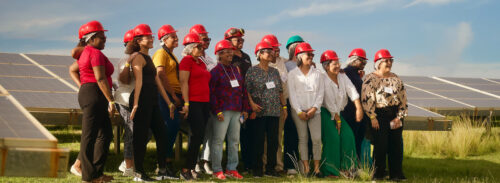
Mentorship in Motion: WIRE Network Celebrates Progress in Barbados
Through the WIRE Network, women in leadership positions are mentoring, inspiring, and supporting the next generation of Caribbean clean energy leaders.
Additional contributors: Laurie Stone, John Matson
“The WIRE Network has been life changing, as it provides a conduit for me to engage with such powerful women in the field…. We are all different but so alike,” said Sheena Gosine, referring to the RMI-run Women in Renewable Energy (WIRE) Network.
Gosine is a mentee in WIRE’s mentorship program. Through opportunities like these, women like Gosine have risen to become innovators and decision-makers in the energy sector, driven by their dedication, hard work, and the support of strong professional networks.
The WIRE Network is a professional development group for women working in energy in island nations throughout the Caribbean. Every year, 12 women are selected to participate in WIRE’s flagship mentorship and networking program. Along with periodic mentor-mentee meetings, the full cohort meets monthly for technical trainings or interpersonal sessions, led by women leaders of the region (often program alumni, underscoring the wider network connection).
The WIRE cohort also convenes every year for training, networking, and planning for the year ahead. This year, the WIRE cohort met in Bridgetown, Barbados, for a three-day convening filled with guest speakers, networking activities, and site visits around the island. Read on for a rundown of the uplifting stories, shared knowledge, and lasting connections that came out of the three-day convening.
Day 1: Site Visits, Solar Facilities, Sheep
The convening began with a morning meetup in the hotel lobby filled with hugs, photos, and laughter. Members of the WIRE Network have formed deep bonds with one another over the years, transcending their professional relationships to strong friendships and mutual trust. After a quick welcome address by RMI’s Laura Diez, the current coordinator of the WIRE Network, the group boarded the tour bus and headed to the Barbados Fair Trade Commission (FTC) for a kickoff session hosted by Marsha Atherley-Ikechi, FTC’s CEO.
The room was filled with excitement as Atherley-Ikechi entered the room. Atherley-Ikechi joined the FTC in 2004 as a water analyst and spoke on her path to becoming the CEO. After addressing a barrage of enthusiastic questions from WIRE members, Atherley-Ikechi left the group with a hopeful message: “If we believe there are no limitations for women, there won’t be.” She noted that the FTC is predominantly women, which Atherley-Ikechi accredited to Barbados’s school system and a matriarchal society.
If we believe there are no limitations for women, there won’t be.

Marsha Atherley-Ikechi (center) with the 2024 WIRE Network.
Next stop: Solar Dynamics headquarters. Solar Dynamics, founded in 1972, was the first solar company established in the Caribbean. Their products include solar water heaters, solar air conditioners, and solar-powered atmospheric water generators. Indrawatee Haraksingh, one of WIRE’s senior advisors, noted that she purchased her Solar Dynamics water heater over 30 years ago and that it was still functioning. She then taught the group the mechanics behind the appliance.
Nevertheless, the standout product was the atmospheric water generator, which pulls humidity from the air to create and cool fresh water. One by one, the group members overcame their skepticism and sampled the water. As Barbados struggles with its fresh water supply, a device that can transform water vapor into potable water could have significant benefits. Our guide, Sami Xhemaili, owner and sales manager, had his hands full with questions and comments throughout the tour.
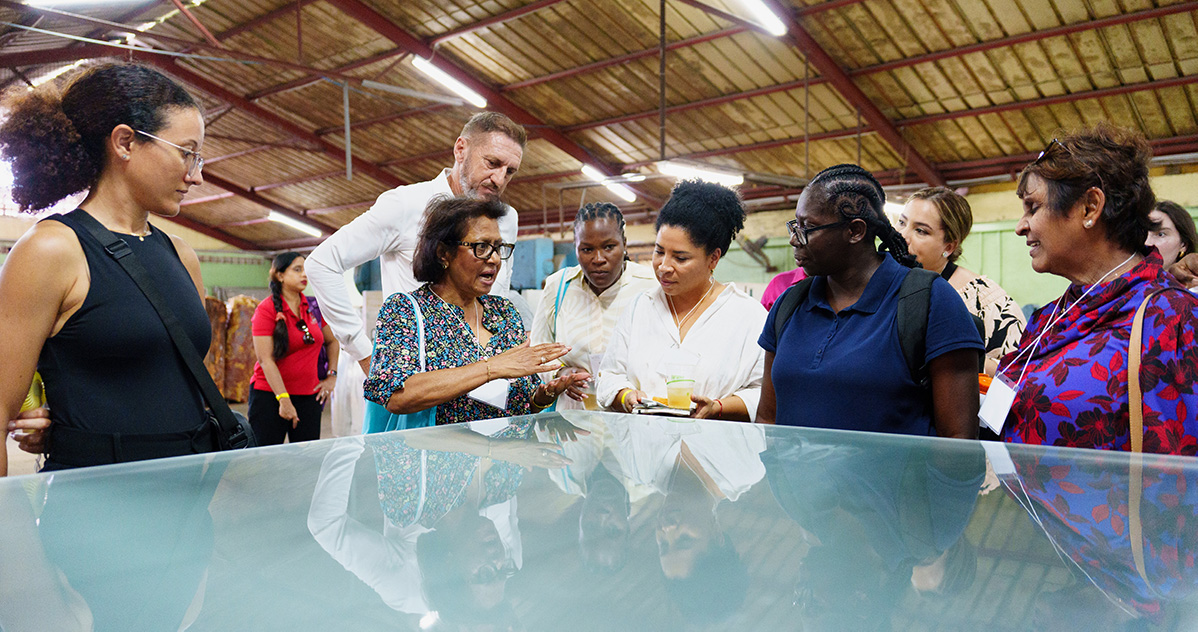
WIRE senior advisor Indra Haraksingh explains the mechanisms behind the solar-powered hot water heater at the Solar Dynamics facility.
The WIRE Network used the bus ride between site visits as an opportunity for engagement and connection. The women discussed desalination plants, water capture methods, and other ways that Barbados could diversity its water systems. They explored the public acceptance of solar in their home countries and how to better market solar energy. They shared stories of their travels and experiences with hurricanes and other natural disasters. They debated value chains, carbon markets, the COP climate change conference, and carbon treaties. Every person, every question, and every discussion pointed to one thing: a future with opportunity.
Our final site visit brought us to the Saint Lucy Solar PV Facility, led by engineering manager Gail Innis. With 10 MW of generation capacity, this facility provides clean energy to approximately 7,700 households in Barbados, offsetting nearly 21,000 tons of CO2 each year. There are 45,000 panels spread over 42 acres, supplying a projected 2.2 percent of annual energy requirements in Barbados. The site also includes a 5 MW Tesla battery bank for emergency preparedness.
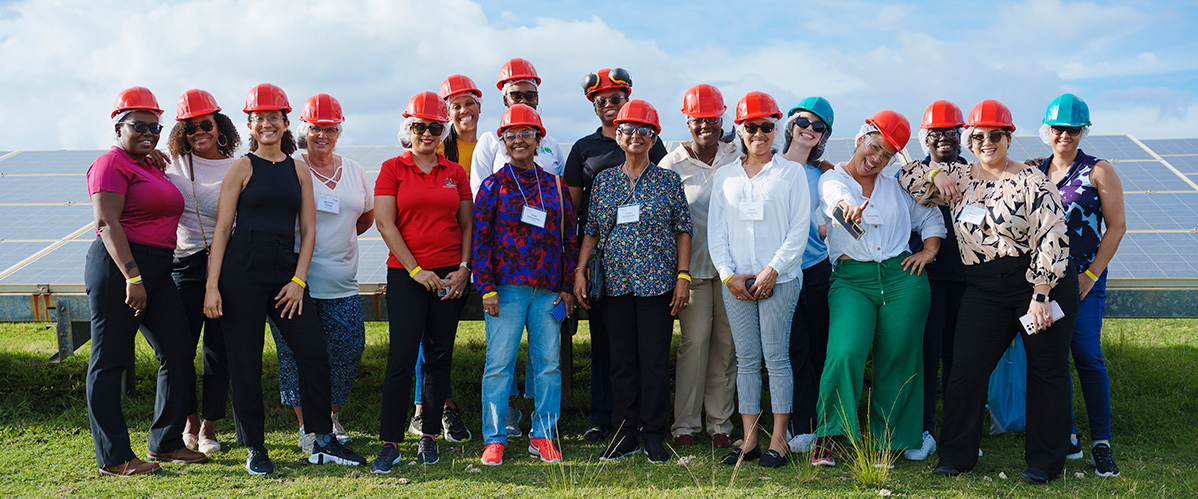
The WIRE Network at the Saint Lucy Solar PV Facility.
Despite a solar farm stretching as far as the eye could see, the highlight of the visit was the hundreds of Barbados blackbelly sheep on site. The field provides year-round grazing for the sheep, and the sheep provide year-round vegetation control for the panels. This unique partnership between sheep and solar is now being utilized all over the world.

Sheep, solar panels, and sunny skies.
Day 2: Maximizing Mentorships and Building Resilience
On our second day in Barbados, we enjoyed a dynamic lineup of guest speakers, featuring insightful presentations from WIRE alumni and government officials. We started with a powerful session led by WIRE alum Davina Layne, executive director of Intimate Hotels of Barbados, on the importance of mentorships. The message was clear: mentoring is a two-way street, a lifelong relationship that encourages personal and professional growth. Mentorships are not just about teaching, but also about guiding and uplifting one another. They’re about listening as much as advising. A mentor should create a safe environment where open communication is encouraged, confidentiality is maintained, and trust is built.
Layne left her audience with a thought-provoking insight on mentorship as one of the responsibilities of leadership: “Leaders help others grow; otherwise, they fail as leaders.”

Davina Layne (left) with WIRE coordinator Laura Diez.
Our next guest speaker, Lisa Cummins, Barbados’ minister of energy and business, shared her journey of mentorship, leadership, and overcoming challenges throughout her career. Her story moved many to tears and sparked a powerful conversation that continued long after her formal remarks were over.
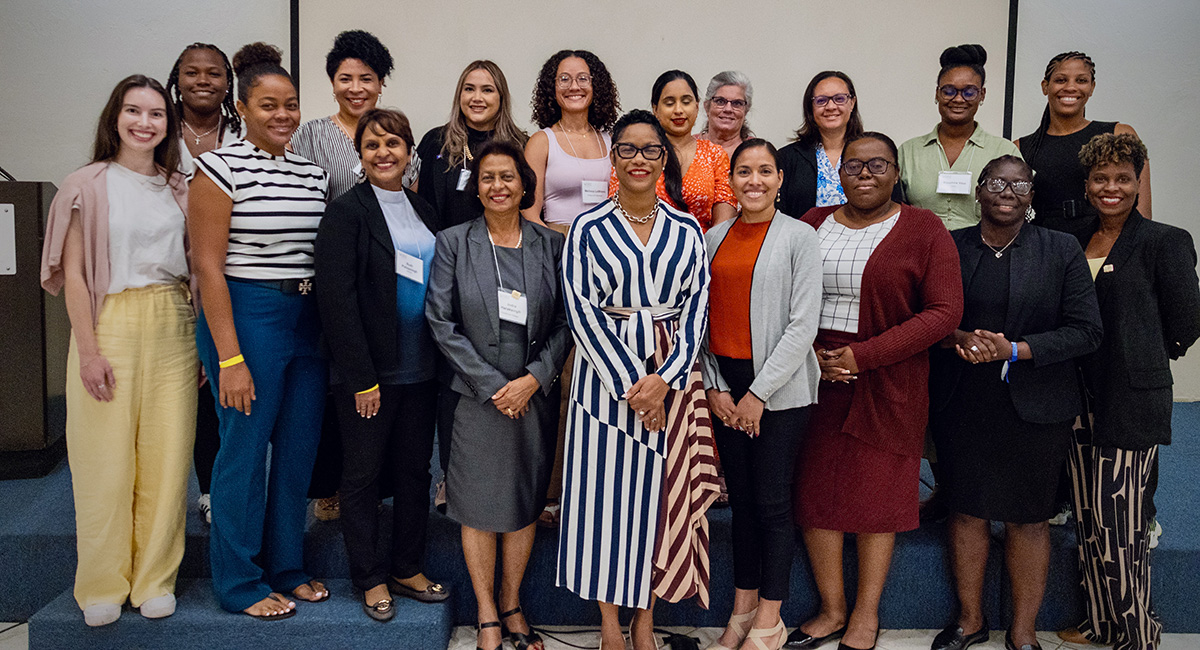
Lisa Cummins (center) with the 2024 WIRE Network.
Cummins’s journey began during her first internship, when she met a mentor who shaped her career. The mentor saw something in Cummins that she didn’t yet see in herself — the ability to lead. Cummins emphasized how this relationship has influenced her life ever since. For Cummins, mentorship is a reciprocal relationship: “As a mentor, you must be able to receive, and then you must be able to give back.”
Cummins’s talk brought attention to the unique challenges that women in leadership face, particularly around navigating trauma and impostor syndrome. She admitted that when she first joined Barbados’ Cabinet in 2020, she felt like she didn’t belong — but learned to push through by focusing on her purpose. “If you know why you are there, the purpose that is within you, you can get through anything,” Cummins explained. “You’re going to go through some stuff. You will struggle with impostor syndrome. You will find people who think that your journey takes away from theirs. You need to be so confident with who you are, and don’t let these people affect you.”
You’re going to go through some stuff. You will struggle with impostor syndrome. You will find people who think that your journey takes away from theirs. You need to be so confident with who you are, and don’t let these people affect you.
Cummins’s talk was greeted with thunderous applause before the group huddled around her. The conversation continued through lunch.

Lisa Cummins with the 2024 WIRE Network.
The final guest speaker of the day was Cherri-Ann Farquharson, capacity development and gender expert at the Caribbean Centre for Renewable Energy & Energy Efficiency (CCREEE). Farquharson led a high-level discussion on the importance of women in leadership and how the Caribbean “sees very few women rising to leadership levels.” She mentioned that while there is currently no gender policy in the energy sector, CCREEE hopes to change that.
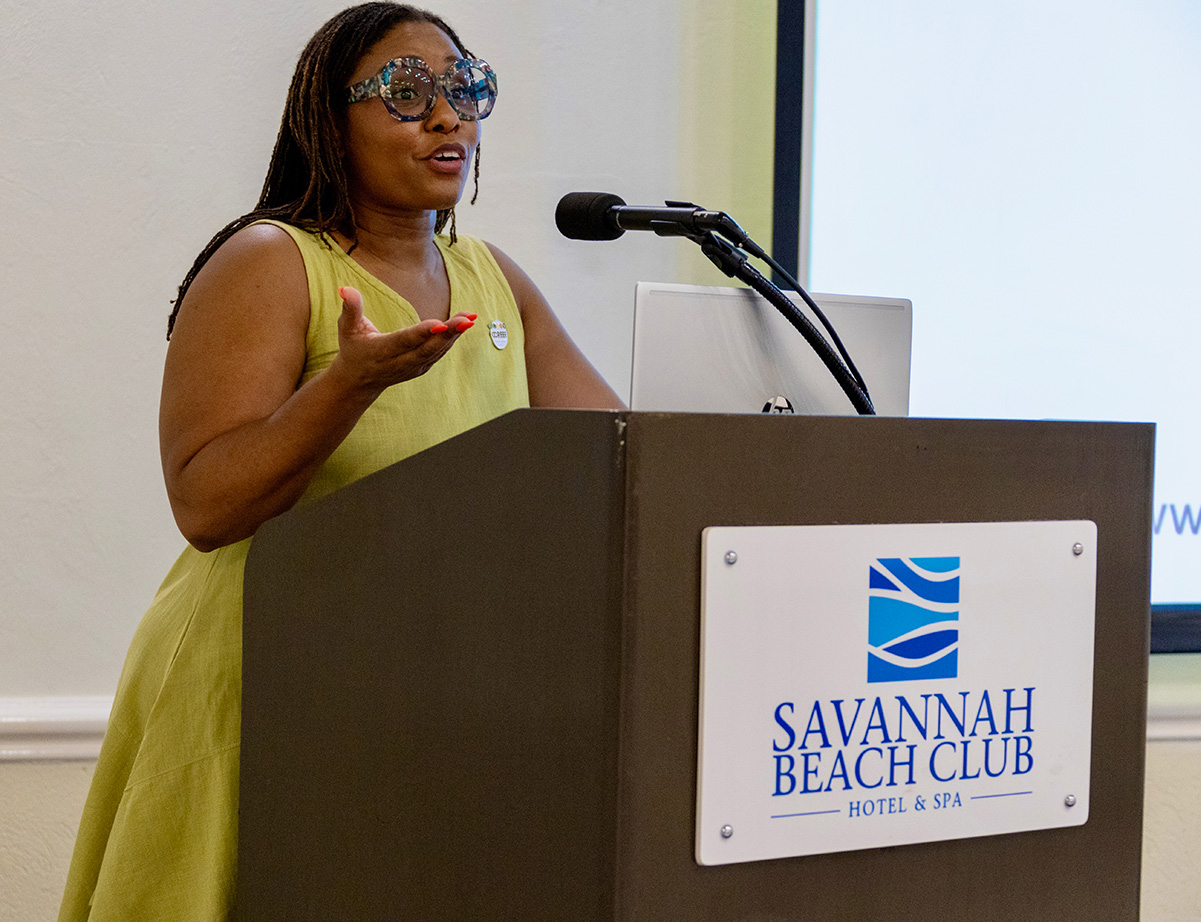
Cherri-Ann Farquharson addressing the WIRE Network.
Calls to Action
In addition to providing mentorship and peer learning opportunities, the WIRE program provides funding to support members in pursuing personal projects that highlight their roles as catalysts for change within their communities. In the afternoon of the second day, we transitioned to hear from WIRE Network members who have created their own calls to action through the program.
With assistance from WIRE funding, Rochelle Johnson, a WIRE mentor from Jamaica, wrote and published a children’s book, The New Car on the Block, to increase awareness about the environment and clean energy technologies while highlighting the role of women. Through storytelling and vibrant illustrations, Rochelle hopes to increase curiosity and empower young readers with knowledge around electric vehicles. The book is now available on Amazon, and she hopes to add the book to the curriculum in primary schools across Jamaica.
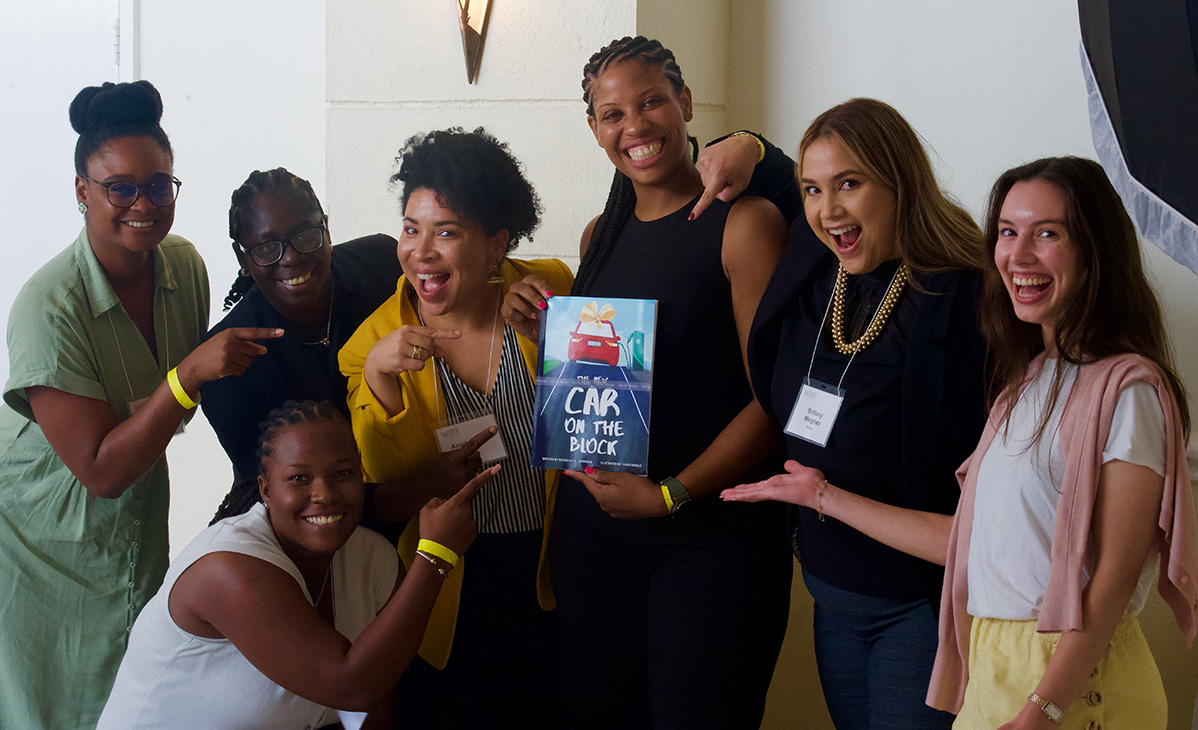
Rochelle Johnson, center, holding her book, The New Car on the Block.
Sheena Gosine, a WIRE mentee from Trinidad and Tobago, also wrote a children’s book, My Island Energy and Me. Gosine initially wrote the book so that her own children would understand the concepts of energy use and how the world changes in relation to their small island. Her book illustrates elementary explanations of high-level concepts, such as the greenhouse effect, and includes fun activities like crossword puzzles and coloring pages.
Anaitee Mills, a WIRE mentee from Jamaica, designed a minicourse on building energy resilience for sustainable energy planning that she hopes to incorporate into the WIRE curriculum for future cohorts. “EmpoweRenergize” was designed for women in entry-level energy sector positions and aims to equip participants with the essential knowledge needed to identify climate risk and develop strategies to build resilience within the sector. The course includes four modules of 15 minutes each, creating a “power hour” approach to professional development. Mills hopes to give back to WIRE because “the WIRE Network has helped me tremendously with expanding my professional network beyond borders in the Caribbean, understanding on a very technical level the status of the energy and climate space in different countries.”
After a long day of listening and reflection, the WIRE Network moved across town to the alumni dinner, attended by local WIRE alumni, partners, and friends from all cohorts. The night was filled with warmth, laughter, and heartfelt connections. The evening was more than just a social gathering — it was a living testament to the strength of mentorships. Each hug, compliment, and story shared reminded everyone in the room that they are part of something bigger — a community where women empower women, lifting each other up every step of the way.
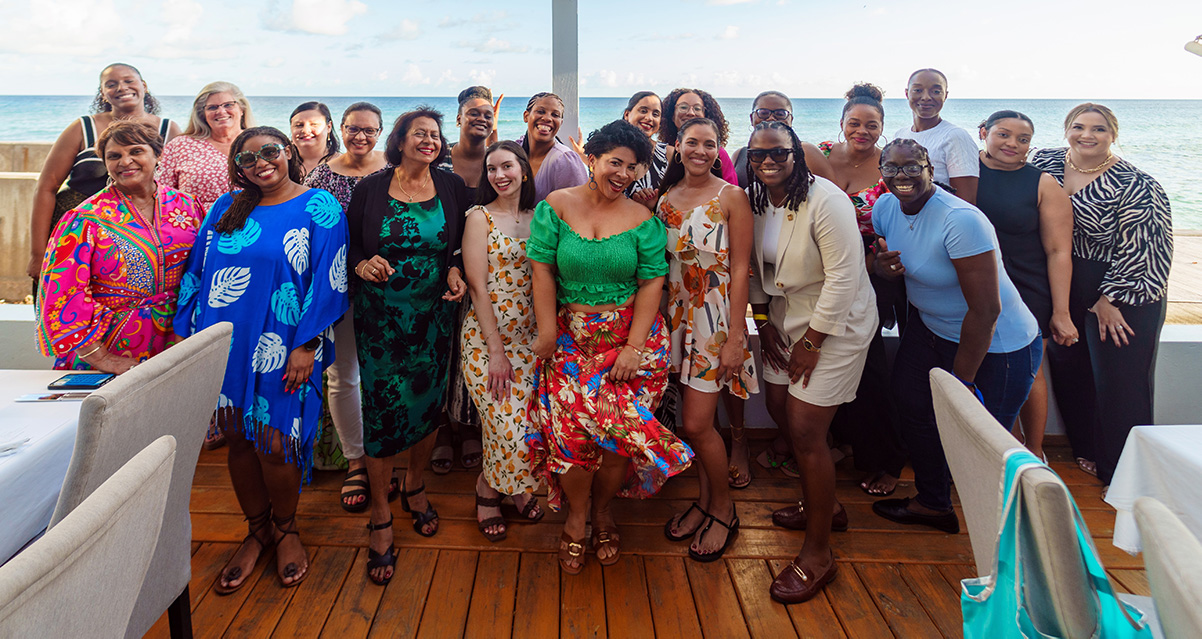
The WIRE Network dinner.
Day 3: Courage, Leadership, and Celebration
Our third and final day started with an emotionally charged session with Ambassador Liz Thompson, a WIRE alum. Her energy was palpable, not only due to her accolades but because of her genuine interest in the people around her. Before diving into her story, she asked everyone in the room to introduce themselves, where they worked, and where they came from. Thompson wasn’t there to simply talk at us; she was there to connect.
Her message was one of bravery and resilience, reminding everyone that “success is not a straight line” and that “sometimes it just takes extraordinary courage.” Thompson’s words were filled with hope, as she urged the women in the room to claim their space, create their own opportunities, and remain bold in their career journeys. She reminded us that success is a journey full of unexpected turns, challenges, and small victories, and that “there isn’t anything you cannot learn.”
Success is not a straight line…Sometimes it just takes extraordinary courage.
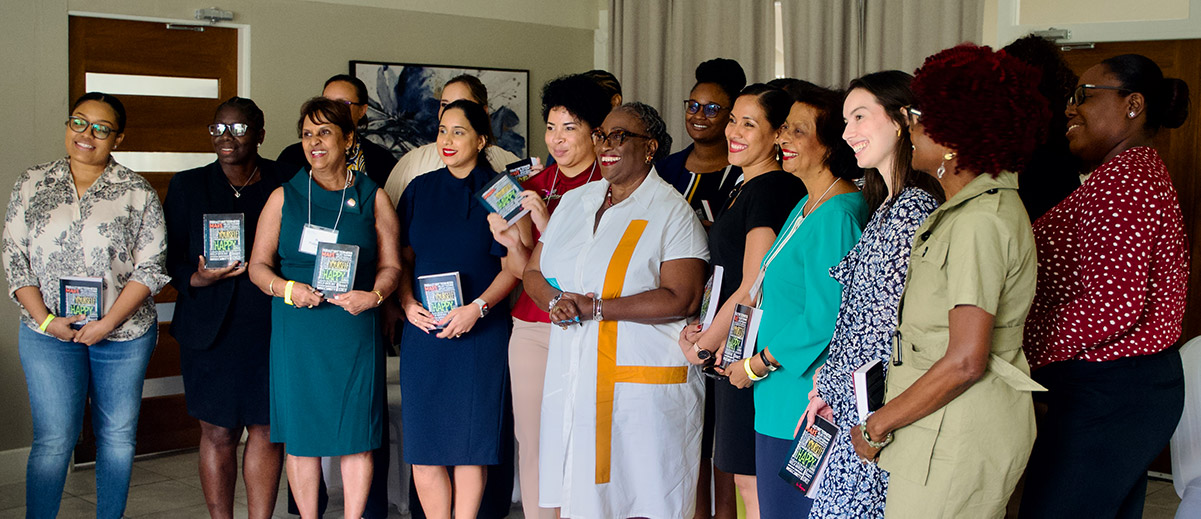
Liz Thompson (center) with the 2024 WIRE Network members holding their signed copies of her book, Make Yourself Happy.
Boarding the bus for the final outing of the week, the WIRE Network headed off for a luncheon visit to the Canadian Imperial Bank of Commerce (CIBC) Caribbean. CIBC Caribbean is 70 percent women, and women hold 50 percent of the leadership roles. At CIBC Caribbean, the WIRE Network was treated to several guest speakers, including a kickoff by Marsha Caddle, Barbados’s minister of industry, innovation, science, and technology.
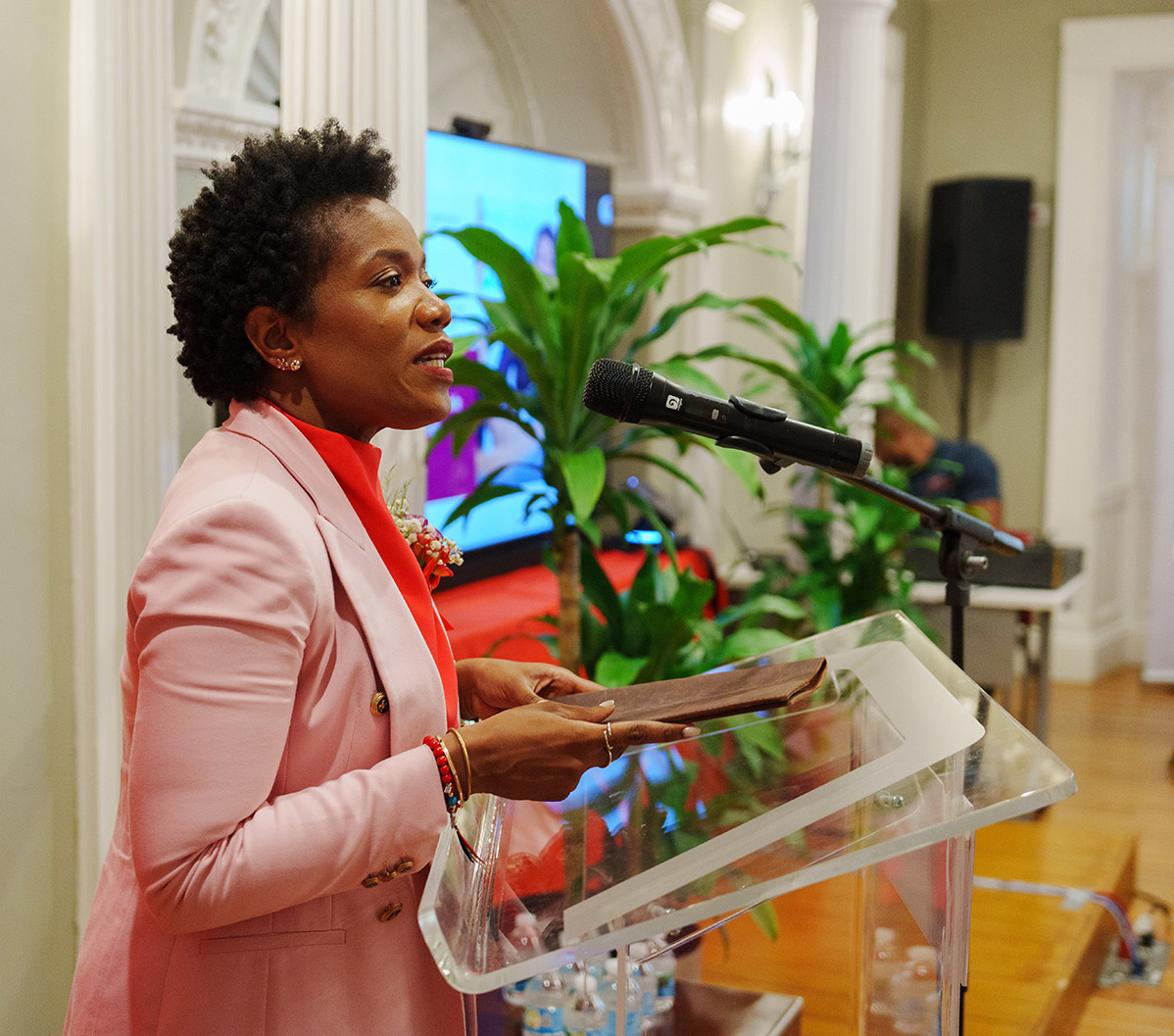
Marsha Caddle at the CIBC luncheon.
The luncheon featured several women in CIBC Caribbean leadership positions: Janine Billy, chief HR officer; Deepa Boucaud, executive director of personal and business banking; and Gillian Charles-Gollop, executive director of corporate banking and sustainable finance. Their insights highlighted the pivotal role of women in leadership, particularly in shaping strategies for sustainable finance and initiatives that support economic resilience and environmental stewardship across the Caribbean.
Creating a Supportive Space
Interviews with WIRE members about their experiences at the convening revealed a recurring theme: a sense of comfort. The WIRE network creates a supportive space where women in renewable energy can exchange ideas, share experiences, and collaborate on their shared journey toward advancing the energy transition. This inclusive environment welcomes individuals of all personalities, backgrounds, and ages, ensuring that everyone feels a sense of belonging. By building and strengthening connections across the network, these women are driving collaboration, amplifying diverse voices, and unlocking new opportunities for collective progress — efforts that not only advance renewable energy but contribute to a more sustainable and equitable future for all.